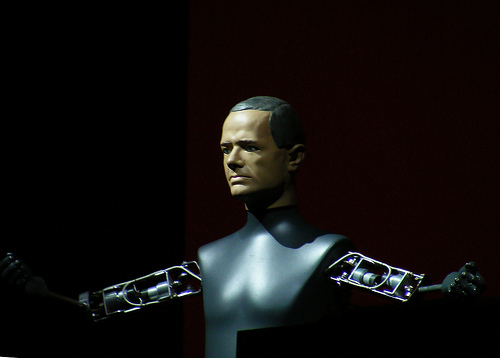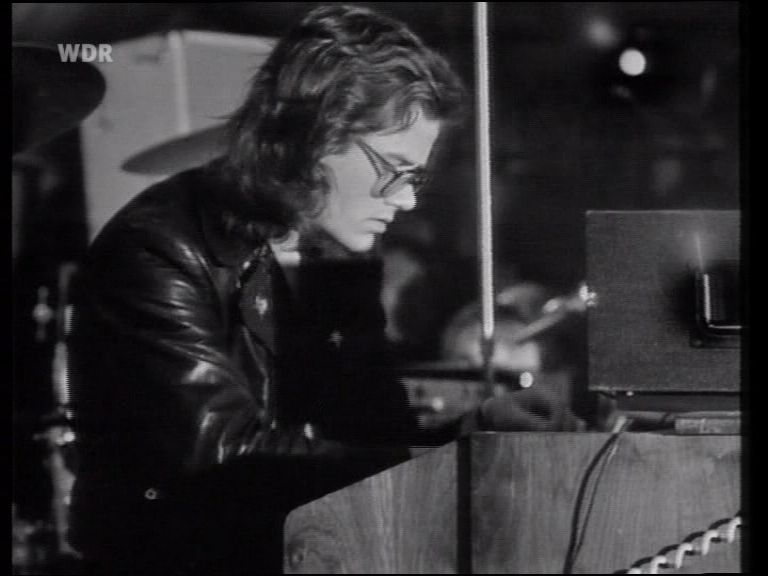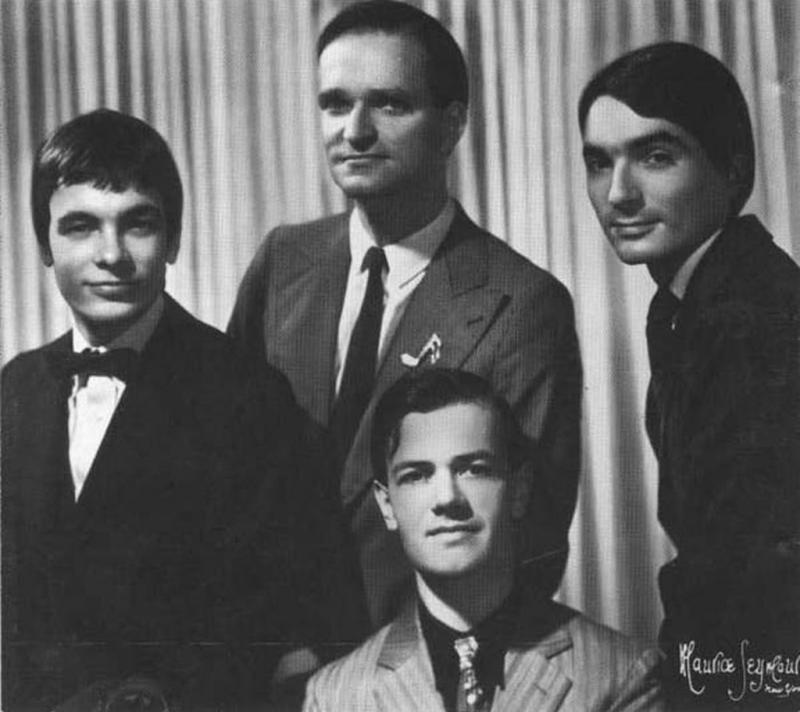Kraftwerk
 Toby Frith
Toby Frith  Thursday, August 27, 2009 at 07:25PM
Thursday, August 27, 2009 at 07:25PM 
Since their re-emergence from the mysterious shadows of Kling Klang in 2003, much has written about Kraftwerk, a band who seem rather fashionable of late. Of course, they never truly went away, as their presence has burned itself emphatically into the DNA of dance music since the late 70’s, but it has been somewhat comforting to see them finally receive, from the more mainstream areas of the press and the like, the accolades that they deserve. The post-disco era and the subsequent historical impact of acid house culture has seen a steady rise in their stock.
From a personal perspective, it has been somewhat galling to grow up seeing a group as influential as them consigned to a peculiar period of music history. Rock journalists found themselves in the 1970’s confused as anyone by the appearance of 4 strange men from Germany making peculiar electronic music without the merest hint of an instrument that might identify them as a “band” whilst wearing suits. Their enquiries were met with steadfast deadpan responses that left them none the wiser as to this group’s intentions. Ultimately, Kraftwerk as they have found regularly throughout their near 40 year career, were perhaps a little too ahead of their time.
It is then a little wistful that the release of Der Katalog in October, a well-needed but inevitably delayed remastering of their albums since 1974’s Autobahn, to me signifies the likelihood that we have seen the last of them in a creative sense. Although it is not in Ralf Hutter’s vocabulary to utter this just yet, the departure of his long-term partner Florian Schneider last year to concentrate on other projects must signify that Kraftwerk will wind down slowly and surely. It could be argued however that this has been the longest wind-down in popular culture, given that Kraftwerk’s sole output since Computer World in 1981 has been the grand total of 2 proper studio albums, a sort of greatest hits, 2 singles and a live album. Given that their last musical release of any real significance in the grander scheme of things was “Die Mensch Maschine” in 1978, it is necessary to talk about Kraftwerk in the past tense from now on. Their live show continues to be a breath-taking experience to the uninitiated, but is essentially a process that has not changed a great deal since their radical 1981 Computer World tour and was originally conceived for a tour promoting “The Man Machine” 3 years earlier.
Kraftwerk’s greatest hindrance has been, somewhat ironically, technology. Whilst it very much defined their oeuvre, the fact was that at their height, electronic equipment was extraordinarily expensive, and much more importantly from a live performance perspective, somewhat unreliable. One of their weaknesses was an inability to produce a live show that did not require them totally relocating their fragile Kling Klang studio with some discomfort and expense. This, combined with a particulary German penchant for perfection and more importantly, a reluctance to share a bill with any other act meant that their live performances, whilst visually and sonically stunning, were rare. Their inability or perhaps reluctance to play live during the 80’s produced something of a huge block on creativity that brought a once-prolific musical partnership to a halt.
Much has been whispered about Kraftwerk’s spectacular lack of activity during the 80’s and 90’s. There has been much discussed about their decision to go digital completely, updating the Kling Klang studio where necessary, to talk of Hutter and Schneider’s obsession with le velo. What is certain is that something somewhere wasn’t right, and that they had found a dead end. In the end though, as the forthcoming remasters will show, what matters is that Kraftwerk were responsible for a singular achievement in popular culture that is amongst the most important in popular music since the War.
Kraftwerk’s popularity, boosted by their recent flurry of activity on the live front, and a growing appreciation of electronic music outside of the preserve of dance music has seen the group of German musicians that they were a part of judged by a new generation. It is important to note that apart from their early beginnings, Kraftwerk were very much different from bands like Cluster and Tangerine Dream. The title “Kosmische Musik”, which has been applied to much of the music of this time from Germany, by its very description was escapist. Kraftwerk however, through their “Tagesmusik”, sought to take inspiration from their surroundings. Thus, whilst Tangerine Dream followed the slightly dodgy meandering of late 19th century German mysticism propogated with titles such as “Hyperborea” and Cluster dabbled with pastoral electronics, Kraftwerk applied a distinctly pop sheen to singing about the mundanity of modern life through a unique retro-futurist lens.
From a purely musical perspective, it is difficult to argue with Kraftwerk being true innovators in terms of composition. They were, after all, writing well-structured but simplistic pop songs, and since “Autobahn” in 1974, have never done anything since. Bands like Cluster, Can and Popol Vuh were more creative and innovative with their approach to music during this period. Their skill came in production, and more importantly, constructing a sonic world that was entirely their own. It is here that Kraftwerk came to the fore, and allied with a directness in their approach to the pop game that made them the wonderful band that we know now.

Although Ralf Hutter and Florian Schneider are said to have met in 1967, it was not until 1970 that they decided to form Kraftwerk as a duo, both of them having previously played in a psychedelic improvisation unit called Organisation. Both were born into upper-middle class sophistication in the heartland of West Germany’s industrial heartland, the Ruhr. Schneider’s father being an internationally renowned architect and Hutter the son of a Doctor. Whilst not quite the hotbed of cultural activity that cities like Darmstadt or Cologne were, Dusseldorf was still close enough to feed off the small and virtually unnoticed artistic revolution that emerged during the late 60’s in West Germany. It is important to note , the influence, whilst not direct, of two central figures on German culture at this time, namely Karl-Heinz Stockhausen and the artist Joseph Beuys. Stockhausen’s role in galvanising a new generation of electronic artists through the Darmstadt new school and his extraordinary broadcasts on WDR in the 50’s helped to shape a new esperanto for a generation that had to discard the heavy baggage of the art they had known before. Joseph Beuys, arguably alongside Warhol the most influential artist since the War, was a shamanic figure and part of the Fluxus scen that set the art world alight with his radical notions of what constituted art and who was an artist. Both men’s energy, intellectual rapaciousness and extraordinary self-belief went a long way to helping create the foundation that would be the bedrock of a new movement.
Between 1970 and 1973 Kraftwerk were mostly a duo of Hutter and Schneider, with the odd contributor such as Michael Rother and the late Klaus Dinger going onto form Neu! and then La Dusseldorf. Although there is much to recommend in the 3 albums they produced during this time, with elements of songs that would come later and almost a nod to a different, more radical approach at points, it is difficult to talk of them in the same vein as their more recognised output. True, elements of the older songs were appearing live as late as their 1975 tour, and it would be myopic to say that the cut off between these albums and the almost Stalinist line of Autobahn being their 1st release was clean. But, apart from elements of Ralf & Florian, they lacked a cohesive concept.
The concept and what came after I believe was brought to them by the artist Emil Schult, who has been an on-off consultant to the band since 1973, and is still a close friend of Hutter’s. He helped to grasp the visual side of the band’s potential, and by Trans Europe Express in 1977, Kraftwerk were a sleek, modernist pop band attracting international attention.
When we look at Kraftwerk’s emergence during the mid-seventies alongside artists such as David Bowie, Roxy Music and The Stooges, they form part of a faintly dark and somewhat sophisticated musical time that was ultimately overshadowed by the twin pronged assault of punk and disco. Both somewhat polarised against each other, yet emerging from New York City and set to dominate musical proceedings for a few years. It is perhaps easy to state that Kraftwerk allied themselves with Disco, given the dancefloor nous of tracks like “Showroom Dummies” and “Trans Europe Express”, but I would argue that from a philosophical and purely aesthetical point of view, they are closer to the aesthetic of punk.
As the younger brother to an elder brother and sister that were somewhat involved with the “Punk” years in the UK, it has from my perspective been difficult to dissociate Punk Rock with anything less than amphetamine-fuelled energy of ear-shredding guitar music and a recividist tendency to regurgitate older forms of music in a stripped-down template made easy for consumption. Yet of course, as we know, Punk was a vastly important movement that did much to galvanise musical culture. It’s ethic stretches far beyond the domain of 3 chord guitar bands. Ally that energy to the philosophy of “Do It Yourself” and a non-reliance on existing systems to produce the product you want, with complete control over it, and you have, arguably, the most potent movement since the War.

So why are Kraftwerk a punk band for want of a better word? Visually they are the complete opposite, being middle aged German technocrats more suited to a business meeting with Siemens when playing live. Straight away then, we have a direct confrontation. By the time of their emergence, the idea of a band playing in suits was abhorrent and almost impossible. To confront this, and do it with such sophistication makes this a statement worthy of any punk ethic. And when compared to the visual harmony of bands such as the Ramones and Devo, who were profoundly influenced by Kraftwerk, then this meme is not so distant as one might imagine.
Kraftwerk sought to create their own, unique sound world, their “sound paintings” as they were called. To do this, it was necessary to summon up new noises. Both Hutter and Schneider were by 1975, hard at work in turning Kling Klang into a studio full of some of the most advanced audio equipment, helped no doubt by the considerable success of Autobahn and young engineers at the company Matten and Wiechers. By 1977, and the advent of Trans Europe Express, Kraftwerk had refined an auditory aesthetic that was to become unique. To find their own sound, it had been necessary literally to create their own machines.
“We cannot deny we are from Germany, because the German mentality, which is more advanced, will always be a part of our behaviour” - Ralf Hutter, 1975
If punk rock was about a generation venting frustration and finding an identity, Kraftwerk took it a step beyond with a confident and sophisticated proclamation of their intent. They played the Pop “game” as dissidents, ther national identity at that time being a powerful taboo, but produced music that was understood and even elicited a passionate response from the mainstream, unlike compatriots like Tangerine Dream, who concentrated on elliptical journeys into the abstract. Kraftwerk’s ambiguity, whether political or sexual, was carefully strategised and as provocative as anything produced by the Sex Pistols or New York Dolls. It is of course, difficult to reconcile Kraftwerk’s careful management of their imagery against the spontaneity of punk’s free-wheeling momentum, but for Emil Schult there is Malcom McClaren and Tony Wilson, and I ultimately think it’s a chymera of an argument. Their affirmation for machines put them in direct opposition to what music was meant to be about - soul - but in the end Kraftwerk turned out to be prophets with their retro-futuristic revelations of society, documented so well in Computer World.
As we look back over the last 40 years, Kraftwerk straddle the hypnotic escapism of disco and punk’s rebelliousness without ever compromising their identity, vision or musical intent. As the various strands of rock’s divergence in the early 70’s becomes clearer, and we take onboard the radical emergence of hiphop at the end of that decade, no other act manages to maintain a presence of integrity across all three genres that is undimmed 30 years later. Their outward simplicity belies an innate yet logical complexity that makes them the most nourishing of bands to savour and taste. Der Katalog will be a potent reminder.
Toby Frith

Reader Comments (5)
Great article!
agree with almost everything you write about them
but I dont think this is the end of their creativitiy
there are rumours of a new album, almost completed
well, time will tell
and time in Kraftwerk land is very long :-)
cheers
Conny
100% with everything Toby wrote. Excellent article on the most important band in the history of modern music! Eagerly awaiting "Der Katalog" in a few weeks !!
Kraftwerk no es muy conocido en sudamerica, pero quienes los conocemos somos muy fanaticos.
Bueno el texto publicado
Kraftwerk is indeed working on new album, check your resorces before you write. Otherwise a fine piece of writing :)
Have tickets a to se them live soon in the sydney opera house!!!